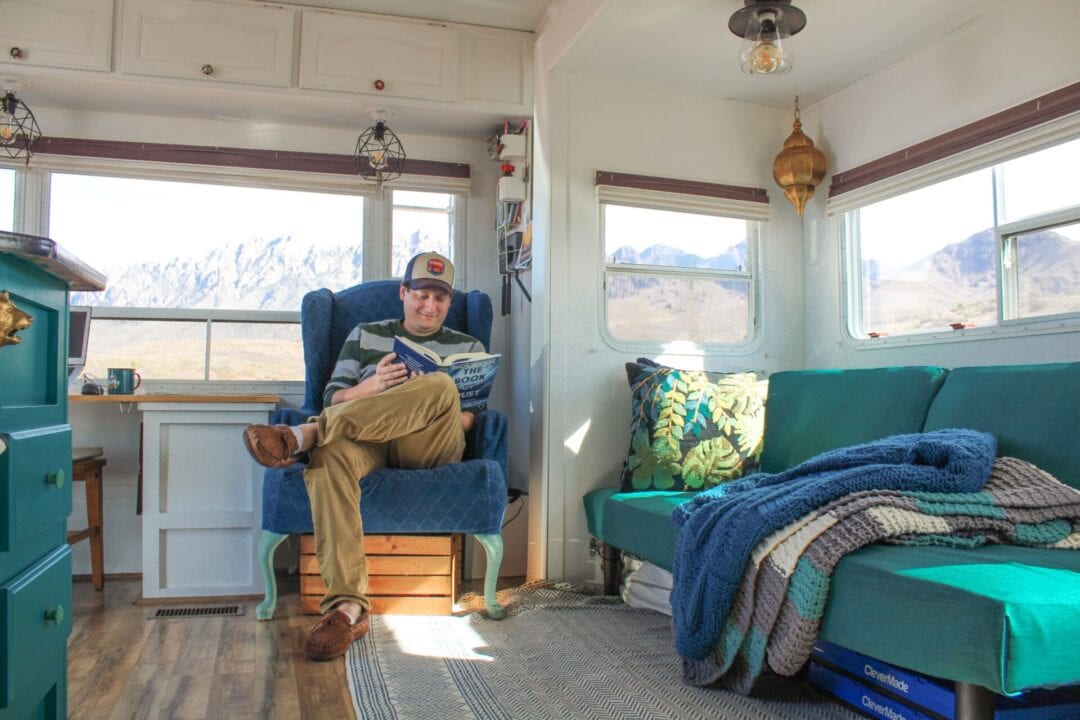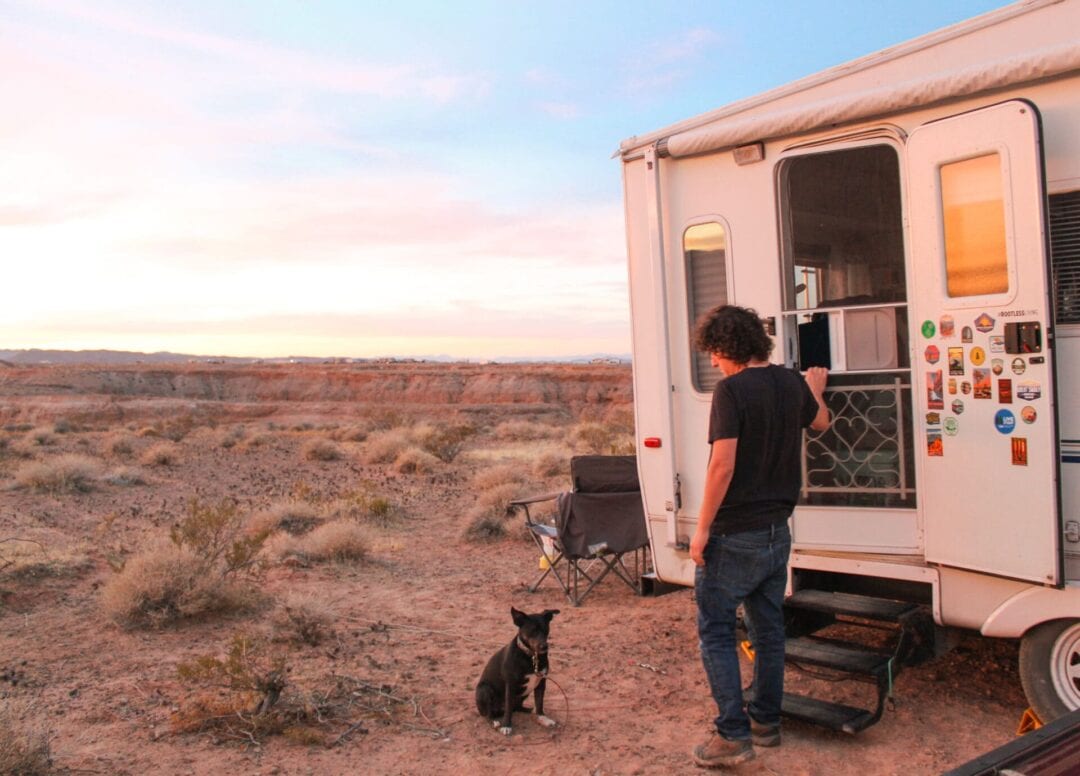We‘ve been full-time RV living, working, and traveling since 2018. Through this lifestyle, we’ve visited 23 states and 25 national parks. Touring the U.S. by RV has opened our eyes to new perspectives, uncovered new interests, and altered our lives. Four years into full-time RV living, we still enjoy living everywhere more than living anywhere.
Living on the road isn’t all adventure and fun though. We spend most of our time working in our RV as full-time remote marketers. We’ve also had our share of setbacks and breakdowns. RV life requires grit, flexibility, and strong problem-solving skills. Ultimately, overcoming the obstacles is worth it for the freedom and joy of RV travel.

Considerations for full-time RV living
Moving into an RV isn’t as simple as hopping behind the wheel and hitting the road. Some aspects of everyday life are different when your home has wheels. You’ll need a game plan for these considerations:
10 mistakes beginner RVers should avoid
Costs
The ability to scale your cost of living is a massive benefit of RV life. You can live in an RV luxuriously or on a budget. The major expenses of full-time RV life are campsite fees, fuel, RV and vehicle payments, and activities as you travel. Don’t forget to account for maintenance, repairs, groceries, mobile phones, WiFi, insurance, and other daily costs like food and supplies. You can make decisions to control most of these costs by choosing the kind of RV lifestyle you want, planning, and sticking to your budget.
Work and income
Unless you’re retired or saved to travel for some time, you’ll need an income to live full-time in an RV. Some RVers work online, while others find short-term jobs and work in one location before moving on to the next.
Sell or store
Downsizing and minimalism are part of the RV lifestyle. You can sell your home and belongings to fund the start-up costs or pay to store your belongings until you’re ready to return to a sticks-and-bricks home.
Domicile state
Even if you travel full-time, you still need a legal address. This determines where you pay taxes, vote, register vehicles, and get your mail. You can claim domicile at a property you own or ask a family member if you can legally “move in” to their residence. Alternatively, you can establish a domicile in a state through a service for RVers. Due to low income taxes and laws, the most popular domicile states for full-time RVers are Florida, South Dakota, and Texas.
If your address is with a family member, you can ask them to manage your mail. Alternatively, you can use a service to receive and forward your mail. Budget for about $100 per year for these services.
Insurance
Purchase good insurance policies for your vehicle and RV, and ensure your policy covers full-time RV travel. Joining a roadside assistance program specifically for RVs comes in handy too. Ensure continuation of health insurance through your employer or in your domicile state. If you’re traveling with a pet, make sure your insurance is established in your domicile state and carry updated vaccine records.
School
If you’re roadschooling your children, make sure you’re familiar with and comply with the homeschool laws in your domicile state.
Internet
Full-time RVers rarely depend on campgrounds for WiFi access. If you require an internet connection for work or school, research cellular data hotspots or satellite internet options. Be aware that no mobile internet solution works everywhere, so you’ll likely need to plan your campsites accordingly or purchase multiple connection options.
What RVers and vanlifers need to know about Starlink
Maintenance
If you live full-time in your RV, it’s not a question of if something breaks, but when. There are excellent RV service centers and mobile mechanics, but the ability to diagnose and fix some issues on your own will make full-time RV living easier. So, bring a toolbox and travel with small replacement parts.
What to look for in a rig for full-timing
There’s no one right RV for full-time RVers. The right RV for you depends on your family size, travel style, budget, and work. Here are some factors for choosing the best RV to call home.
Size
How much space do you need to accommodate your family? The more family members, the more beds and square footage you’ll require. Don’t forget, while bigger RVs are more comfortable, they’re more cumbersome for travel and finding campsites.
Layout
Choose an RV layout that fits your family’s daily life. Do you need an office with a closed door to focus? Are there enough workspaces for everyone’s work and school? Is there enough storage for everyone’s belongings? Are your kitchen and fridge big enough for your cooking requirements?
How to plan a safe and fun RV route with a big rig
Tank size
The size of your fresh, gray, and black tanks can dictate your RV lifestyle. If you prefer boondocking and public campgrounds, you may want to purchase an RV with larger tanks, especially if you have a family. Tank size is not as crucial if you mainly stay in full-hookup RV parks.
Other features to consider
RVs don’t have as many appliances and comforts as a house. What other features do you need for daily life? Is an in-RV washer and dryer vital to you, or are you fine using campground and public laundromats? Do you want to invest in solar and battery upgrades for a more off-grid lifestyle? Do you require a full bathroom, or will a wet bath or campground showers suffice?
Booking campgrounds while full-time traveling
Parking your home around the country is fun but requires planning to book campgrounds. There is a vast campground style and pricing range, from nature and solitude to urban RV parks.
Types of campgrounds
There are three main types of campgrounds: private RV parks, public campgrounds, and public lands. Private RV parks usually offer more amenities and the option for extended stays but can be more expensive. Public campgrounds like national and state parks have fewer conveniences and require RVers to move frequently, but cost less and offer more rustic settings. Parking on public land is free but has shorter stay limits and no resources. Some full-time RVers stick to one type of campground, while others dabble in all three as they travel.
Stay length
How often do you want to move? Some full-time RVers enjoy going somewhere new every few days. Others stay at a campground for 1 to 2 weeks, while some settle into an RV park for one or several months. The longer you want to stay in one place, the further ahead you’ll need to book your campsite.
The ultimate guide to part-time RV travel
Plan and be flexible
Constantly booking campgrounds is part of full-time RV living. Consider the weather seasons, the sights you want to visit, the high tourist seasons for the destination, and local costs. Peak months in popular campgrounds, such as Florida in the winter or Colorado in the summer, will reach capacity months or even a year in advance.
If you have your heart set on a specific campground, research when its reservation window opens and book immediately. However, be flexible enough to visit destinations in shoulder seasons or stay in less frequented campsites.

Traveling full-time in your RV
Full-time RVing can live up to the dream, but it’s not a full-time vacation. Long-term RV travel requires practice and management to sustain for months or years to come.
Visiting new places
Traveling to new destinations is the best part of RV travel. Make a bucket list of things you want to see and experience. Do you prefer outdoor activities and national parks, exploring the bustle of new cities, or a little of both? Keep an open mind to new interests and experiences too. Getting out of your comfort zone and getting to know people and places different from you can be the most enriching part of travel. Remember—you’ll never be able to see everything in one or even dozens of RV trips. Try to slow down and soak in the places you visit.
Travel days
Full-time RVers spend a lot of time on the road. Driving with an RV is slower and more unpredictable, so estimate an extra 25 percent for your drive time, and don’t push yourself (or your rig). Check maps carefully to ensure the roads and bridges accommodate your RV length and height. For drives longer than a day, reserve a campground or plan overnight RV parking in a retail location or rest stop that allows 1-night stays.
Maintaining relationships
If you’re traveling full-time, you might miss the sense of community that comes with staying in one place. Make travel plans that include visiting friends or family or invite them to meet up with you on the road. RVers are open to meeting new people, so don’t hesitate to use social media platforms and campground events as opportunities to make new friends. Take time to nurture your own traveling family too. The constant togetherness and small spaces shift dynamics, so practice open communication and plan focused time together.
Manage resources
RV life requires constant resource management. From conserving utilities to finding new grocery stores and juggling travel schedules, daily life isn’t as convenient as living in a house. There’s a learning curve for everyone, so embrace it as much as you can.
Common questions about full-time RVing
The costs of full-time RV living vary greatly depending on your RV lifestyle, but you can quickly scale your budget depending on the type of campgrounds you stay in and how often you travel to the next destination.
You can live permanently in an RV as long as you’ve established and maintained a domicile address with the associated taxes and legal requirements.
Prepare for full-time RV living by researching and planning your RV setup, income, school, domicile address, travel plans, and campground reservations. Read and listen to others’ experiences on blogs, videos, and social media to learn what to expect from daily RV life.
The specifics of how taxes work when you live in an RV vary depending on your income sources, but generally, you pay taxes according to the state you establish a domicile in.
Most RVers move to warmer climates during the winter months, often referred to as “snowbirding.” However, if you live in your RV in cold weather, heat the interior with an electric or propane heater. Use insulation and heated lines to prevent your hookups and plumbing from freezing.
Many considerations and decisions need to be made before you embark on full-time RV life. The more research and planning you do, the more prepared you will be. However, you’ll always learn new things as you go, so enjoy the adventure.





